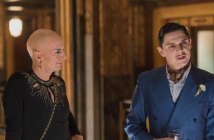Masters of Sex, Season 2, Episode 6, “Blackbird
Sunday August 17, 2014, 10:00 p.m. (EST), Showtime
A few weeks back, Masters of Sex gave us one of the best hours of television I’ve seen this year so far in “Fight.” On the surface, that episode bore a more than slight resemblance to one of the all-time great episodes of another great series, Mad Men’s “The Suitcase”: it was an episode taking place largely in one location on the night of a landmark boxing match, where an older man and a younger woman with a complex, contentious working relationship sorted through their personal and professional problems. The climax of “Blackbird,” in which Virginia comes upon Lillian in bed after having taken sleeping pills, knows that she could stop her death, and chooses not to bears a surface resemblance to a climactic event in the second season of Breaking Bad. To say that Masters of Sex is lifting from some of the best would be disingenuous: Michelle Ashford has already expressed her ignorance of “The Suitcase” and embarrassment about the similarities, and I am sure the same holds true for tonight’s glancing resemblance to a (contextually very different) moment on Breaking Bad. I bring this up only to make a very different point: in this second season, even when Masters of Sex appears to be aping other series or engages in plotting that feels somewhat familiar, this is a series that has fully come into its own. These moments don’t play as homage or as thievery. They don’t even play as close comparisons if you consider them in-depth. What Masters of Sex does, it does for its own reasons, in its own way. It is a series that has gained the confidence that is necessary for greatness to follow suit.
As an episode “Blackbird” is a bit of a mess, a hodge-podge of various subplots coming to a head that never fully coalesces. It’s clear that at the halfway point for this season, the writers wanted to blow everything up, and it seems like season two may eventually cleave neatly into two halves with “Blackbird” as the dividing line. For the moment, though, the episode seems more interested in tying up loose ends than in serving the stories it is putting to bed for the moment. Some of these stories have been built to enough that they land; others are left flailing a bit.
Let’s start with one that doesn’t work at all: Libby the paranoid racist. This subplot is trying to do a great many things, some of them more gracefully than others. It is a story about Libby, who controls virtually nothing about her own life, trying desperately to exert some power over the one area of her life where she has authority. It is a canny mirror to the way Bill uses his power to exert control over the people in his life (and mostly gets away with it in ways Libby can’t due in large part to her gender). It is also a foil, both thematically and from an explicit plot perspective, to Bill’s attitude as he moves to Buell Green, highlighting both the strife he was set to experience due to the prejudice of the times, and the conflicts he might face domestically. There’s a lot of potential in all of these areas to be mined. And yet, this story just never worked.
This comes down, in large part, to the unspoken problem that underlies any Libby Masters story at this moment in time: there is a tendency on the part of the audience, and probably on the part of at least some writers, to dislike Libby because she stands in the way of Bill and Virginia getting together (call this the “Skylar White Problem,” wherein fans turn vitriolic towards any character perceived as a threat to the protagonist’s victory, whether or not that distaste is deserved). So much as the “Libby is a paranoid racist” story has a lot of potential, its execution has seemingly come down to a series of cheap excuses to allow us to dislike Libby, to think less of her as a person, and so to feel more comfortable with the idea of Bill and Virginia’s affair. This is probably the exact opposite of how the show should be treating Libby as a character. She shouldn’t be demonized because she is some abstract obstacle of plotting; she should be humanized because she is a person, a wife and a new mother who is trapped, confused, neglected, terrified, and angry. Masters of Sex hasn’t given Libby a fair shake so far this season. It has forgotten that, above all else, she is a person worth considering and respecting. The show has treated her like her husband does. And so instead of a clever exploration of some of her flaws and how they are similar to or different than her husband’s, this subplot has tried to turn her into a caricature to make her easier to dismiss.
Another subplot that has worked better comes too quickly to a close as Bill leaves Buell Green. I’ve been impressed so far with the way Masters of Sex has handled race relations in the period, and has developed several African American characters who feel lived-in and exist as much more than set dressing or period detail (this is a problem Mad Men has tried to address and never fully overcome). Keke Palmer has been excellent as Coral, and Courtney B. Vance took less than two episodes to make Dr. Charles Hendricks a completely indelible character. Vance’s work here is so stellar, that he manages to make Hendricks a man of contradictions who still hangs together, a complex, fascinating figure who is far more than a simple obstacle or an antagonist. I looked forward to getting to know Hendricks, and it is a shame the show has chosen to veer so swiftly away from the exciting new premise it introduced just a few weeks ago. It was always clear Bill wouldn’t remain at Buell Green forever, but the show introduced so many interesting dynamics and potential directions, I had hoped we would spend time delving into them. The story of Masters and Johnson’s tenure at Buell Green could have been a captivating subplot for this season, and it’s a shame to see it end up a fascinating footnote instead.
“Blackbird” also finally brings us to the tragic demise of Lillian DePaul. Over the course of this series so far, Virginia and Lillian have become one of my favorite female friendships on television, and for all of its faults elsewhere, this episode nails the way it comes to a close. Watching the two fully embrace their friendship in what becomes Lillian’s final night, discussing her failure to ever truly romantically connect with a man and Virginia’s understanding that Bill loves her even if he never says it, is absolutely wonderful stuff, and it is a shame to see Julianne Nicholson depart here. Her performance has always been very strong, and she gets a last chance to play nearly every facet of Lillian tonight. That “Blackbird” is such a greatest hits compilation for the character telegraphs her demise perhaps a bit broadly, but then, I treasured every moment spent with her, and the episode handles the way she and Virginia have unexpectedly burrowed into each other’s hearts beautifully.
The episode also shows us more of the slow dissolution of Gene and Betty’s marriage. I’ve been of two minds about this story for a while now. On the one hand, it has always struck me as filler, the show struggling to find something to distract us from the vacuum created by the absence of Beau Bridges and Allison Janney. Annaleigh Ashford and Greg Grunberg are very good here (in fact, I think Grunberg’s work as Gene is his career best), but it is hard not to look at this tale of marital strife and think of the much more engaging one that it has replaced. On the other hand, watching the lies pile up and understanding the problems in this marriage from both sides has been very engaging, and increasingly so as we have come to know both of them. Betty was a tragic figure on the margins of the first season, who got a bittersweet happy ending by marrying Gene. Yet as we’ve grown to know her over this half season, we understand more deeply all that she’s given up for this façade, this approximation of a life she would otherwise never have seen. We’ve also watched as Gene’s fairytale conception of his marriage was undermined as little imperfections kept denting his sterling notion of Betty and their union.
Cramming in Betty’s affair with Helen (Sarah Silverman is adequate here, but never imbues Helen with the spark she’d need to pull off the idea that Betty and Helen are soulmates so quickly here) and that confrontation before the party into an episode already packed with incident is probably a bit much, and it feels like this was rushed to a conclusion of sorts so that the show could move on to different things (perhaps more Bridges and Janney, who I believe are returning at some point later in the season). Ultimately, that final scene is fantastic, but this story has dealt with effectively the exact same subject matter as the Scullys marriage (a gay spouse’s attempts to restrain that part of themselves slowly destroys a marriage) and in a less interesting way. Masters of Sex may manage to ape the greats effectively, but in this subplot, it is a poor mimic of itself.
This season of Masters of Sex has so much going for it, it is a little infuriating to watch “Blackbird” dismantle everything and tear down all that had been built up. We’re losing Buell Green. We’ve lost Lillian. We’re seeing conclusions for some of the greatest things about this season so far. On the bright side, it looks like Coral’s dismissal means an end to Libby’s incredibly frustrating bout of racist paranoia, and the button seems to have been placed on the Moretti marriage, at least for the moment. Masters of Sex is moving on to new things. Only time will tell if they are better. For now, we stand at a crossroads, one we’ve reached a bit too quickly, racing past sights where we might have lingered, and cutting off moments that could have played out much longer. This is a messy episode of the show, but it also does little to undermine my growing confidence in this series. Masters of Sex knows what it’s doing. Like the late, great Lillian DePaul, it knows who it is, and no surface similarities to other shows, nor cumbersome plotlines that never quite click can shake off that sense of self-possession. This is a series that is headed somewhere, and if there are bumps along the road, they are only reminders that we’re headed for a great destination.
The Roundup
- “Now if you don’t mind, I came in here to take a leak. Unless you’d like to watch…”
- “You’re enough. That’s what I’m trying to say.”
- “Oh, and because its for science its not the same thing?”
- “I’m always so careful, you know. With people. I’m always…I keep that wall up.”
- “She knows me.” “I know you.”
- “You don’t get to say what’s included in the piece.” “It’s my study.” “And its my story.”
- “Are you going to invite me in?” “I don’t open my door to salesmen.” “I’m not selling anything.” “Aren’t you always? You peddled diet pills in a cancer ward.” “That was not my finest moment.”
- “Please, just for once, tell me: who are you, really?”
- “A little piece of you is always the girl you were at thirteen.”
As an episode “Blackbird” is a bit of a mess, a hodge-podge of various subplots coming to a head that never fully coalesces.
-
OKAY




